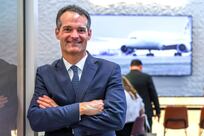Abu Dhabi took a step closer to realising its ambitions of becoming a serious player in the semiconductor industry after a “cleanroom” facility in the Masdar Institute became fully operational this week.
The cleanroom, sponsored by Abu Dhabi Technology Investment Company (Atic), is intended to play a key role in semiconductor and nanotechnology research at the institute.
“This facility is a strong asset to research in advanced technology and the only such cleanroom in the GCC,” said Sami Issa, the executive director at Atic.
“The research taking place in this cleanroom is guided by targeted industry and academic collaboration, playing a key role driving technology development while laying the foundations for a thriving research hub in the region.”
A cleanroom is a specialised laboratory room in which the air is highly filtered to keep out impurities that may affect the different processes involved in making a semiconductor chip.
A typical cubic metre of air contains about 12 million particles. A cleanroom facility has fewer than 1,000 particles.
Masdar hopes the facility will serve as an example for the rest of the region keen to set up similar facilities in their own research labs.
Mike Tiner, the manager of fabrication and microscopy facilities at Masdar Institute, said: “With any semiconductor plant, you have this need for people to work in it and they need to be very highly skilled. When you come to a place like the UAE, we don’t have that base of knowledge so we have to figure out how to operate it, this is what this facility does.
“On the one hand it is important for research, on the other hand it is a chance for big innovation, it will take the industry to the next level.”
Countries such as the UAE have taken to investing in advanced technologies to diversify economies away from oil. The semiconductor industry is one such example for this country through its investment in GlobalFoundries. Atic has plans to open a foundry in Abu Dhabi.
The UAE in general has a labour shortage and has had to invest in capital-intensive industries, according to Fred Moavenzadeh, the president of the Masdar Institute. “The UAE has been moving aggressively towards nano technology and aerospace,” he said.
“These are very advanced technology and capital-intensive industries, unlike China and Korea where they prefer labour-intensive technologies.”
There are 85 people at the Masdar Institute certified to use the new facility. The institute has 14 active projects ranging from making organic solar cells to more advanced research involving the use of new materials. There are a further 20 projects on the facility’s waiting list.
Aamna Rashed Al Shehhi, a third-year student at the Masdar Institute, is working on one of these projects.
“It should happen in every country, this is good for me to contribute to my country to work in this field,” she said.
“Having a cleanroom at hand in the UAE makes it easy for us to use at any time with support from the faculty and our professors.”
thamid@thenational.ae





